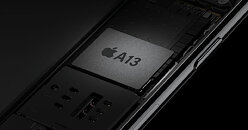Tuesday, June 9th 2020

Apple to Announce its own Mac Processor at WWDC (Late June)
Apple is planning to launch its own high-performance processors designed for Macs at the 2020 WWDC, held in the week of 22 June, 2020. This would be the the first step among many toward the replacement of Intel processors and the x86 machine architecture from the Apple Mac ecosystem, in the same fashion as the company replaced PowerPC with x86 last decade. Apple has codenamed the process of graduating to the new machine architecture "Kalamata," and besides detailing the new processor and its architecture, the company could announce a large-scale developer support initiative to help Mac software vendors to transition to the new architecture in time for the first Macs with the new processors to roll out in 2021.
A Bloomberg report on the new processors states that the chips will be based on the "same technology" as the company's A-series SoCs for iOS devices, meaning that Apple will leverage the Arm machine architecture, and has probably developed a high performance CPU core that can match Intel's x64 cores in IPC and efficiency. Macs based on the new processors, will however run MacOS and not iOS, which means much of the clean-break transition woes between PPC and x86 Macs are bound to return, but probably better managed by software vendors. It also remains to be seen how Apple handles graphics. The company could scale up the Metal-optimized iGPU found in its A-series SoCs on its new Mac processor, while also giving them the platform I/O capability to support discrete graphics from companies such as AMD.
Source:
Bloomberg
A Bloomberg report on the new processors states that the chips will be based on the "same technology" as the company's A-series SoCs for iOS devices, meaning that Apple will leverage the Arm machine architecture, and has probably developed a high performance CPU core that can match Intel's x64 cores in IPC and efficiency. Macs based on the new processors, will however run MacOS and not iOS, which means much of the clean-break transition woes between PPC and x86 Macs are bound to return, but probably better managed by software vendors. It also remains to be seen how Apple handles graphics. The company could scale up the Metal-optimized iGPU found in its A-series SoCs on its new Mac processor, while also giving them the platform I/O capability to support discrete graphics from companies such as AMD.

79 Comments on Apple to Announce its own Mac Processor at WWDC (Late June)
Also, I'm kinda not convinced that even iMac Pro and Mac Pro will get Arm processors in 2021. Apple could kick x86 in a phased manner. Beginning with MacBooks and iMac, then MBPs, and finally Mac Pros and iMac Pros. We'll see.
Also, it would be ironic if ARM based Macs were what made W10 ARM take off
I bet these are pretty fast too.
Im sure that the emulators (parralels etc) will still work to run windows software for those people who use macs in corp environments.
I'm curious to see how this pans out, but I'm expecting the software market for Macs to either get dumbed down to iOS-grade products, or worse still - just shrink as many developers can't be bothered to rewrite their software from the ground up for a completely different architecture. They'll just continue to offer Windows, Linux, and Chrome support and make do with the 90% of the market that isn't using a Mac.
Increases autonomy by 45%.
Reduces performance by 200%.Double the price.
Sounds Good, more expensive paperweights to feed the compulsive
zombiesconsumers that apple created. :Pwww.google.com/maps/d/viewer?msa=0&mid=1LfB_qRfTXoheUIXQ6ugdfJNs9NM&ll=37.057693947591055%2C23.864664797087322&z=8
In the real world, ARM is destroyed by the x86 duopoly: www.phoronix.com/scan.php?page=article&item=epyc-vs-graviton2&num=8 EPYC just lost in tests so badly optimized that do not even recognize the SMT. :P
And then there is the fact that x86 software will have to be remade to work on those new Macs. We don't know what's Adobe's stance on this, we don't know what other developers will do, right now there is absolutely no precise information on what will they do and I don't even think there is information available about how well prepared they would be to port x86 code to ARM code.
So, I stand by what I said earlier, we can not say "it will be great" or "it will be shit" until the device is actually available and software with ARM target is made.
And, oh well, Apple users deserve that kind of treatment.
And I've even spotted a working prototype: